
COMPOST SCIENCE & UTILIZATION
metrics 2024
Pioneering Research in Composting and Resource Recovery.
Introduction
COMPOST SCIENCE & UTILIZATION is a vital academic journal published by Taylor & Francis Inc that addresses the interdisciplinary aspects of composting, recycling, and sustainable waste management practices. With an ISSN of 1065-657X and an E-ISSN of 2326-2397, this journal ensures wide accessibility to its contributions, even though it does not operate under an open access model. Operating from the United Kingdom with a rich history from 1993 to 2024, the journal is ranked in the Q3 quartile across key categories including Ecology, Soil Science, and Waste Management and Disposal. The journal’s Scopus rankings underscore its impact in the environmental sciences, with notable placements in relevant fields, reflecting its importance in promoting innovative research on composting and sustainable practices. Researchers, professionals, and students dedicated to environmental sustainability will find valuable insights and developments relevant to compost science within its pages, making it an essential resource in the quest for eco-friendly solutions.
Metrics 2024
 0.33
0.33 2.00
2.00 2.00
2.00 57
57Metrics History
Rank 2024
Scopus
IF (Web Of Science)
JCI (Web Of Science)
Quartile History
Similar Journals
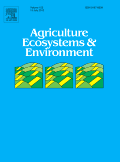
AGRICULTURE ECOSYSTEMS & ENVIRONMENT
Exploring the Interconnections of Ecosystems and AgricultureAGRICULTURE ECOSYSTEMS & ENVIRONMENT is a premier journal published by Elsevier, specializing in the fields of agronomy, animal science, and ecology. With an impressive impact factor reflective of its stature, it ranks in the top quartile (Q1) across three significant categories, highlighting its critical role in advancing research within the agricultural and environmental sciences. The journal serves as a vital platform for disseminating high-quality research that addresses the complex interactions between agriculture and ecosystems, providing insightful methodologies and findings that inform sustainable practices. As the journal continues to converge from 1983 and through to 2025, it remains committed to offering both traditional and innovative access options while contributing to the academic community's understanding of pressing environmental challenges. Researchers, professionals, and students are encouraged to engage with the journal's comprehensive content, which is positioned among the elite in its fields, having achieved top rankings in Scopus across relevant disciplines.

PLANT SOIL AND ENVIRONMENT
Fostering Global Dialogue on Soil and Environmental Science.PLANT SOIL AND ENVIRONMENT is a premier open-access journal dedicated to the interdisciplinary study of soil science, agronomy, and environmental interactions, published by the Czech Academy Agricultural Sciences. With an ISSN of 1214-1178 and E-ISSN 1805-9368, this journal has been a vital platform for dissemination of research since its inception in 2002. Based in the Czech Republic, it has garnered a robust reputation within its field, as indicated by its impressive Q2 ranking in Soil Science and ranking #47 out of 159 in the Scopus Ranks for Agricultural and Biological Sciences, placing it in the 70th percentile overall. The journal explores diverse topics within soils and their significant roles in plant health, ecosystem services, and sustainable agricultural practices, contributing important insights that benefit researchers, practitioners, and policy-makers alike. Aiming for a global outreach, PLANT SOIL AND ENVIRONMENT not only facilitates open dialogue among scientists but also ensures that cutting-edge research is freely accessible to enhance the knowledge base in soil science.

AGROCHIMICA
Fostering innovation in agronomy and food systems.AGROCHIMICA is an eminent journal published by PISA UNIV PRESS, dedicated to advancing the fields of Agronomy, Crop Science, Food Science, and Soil Science. With a rich history dating back to its inception in 1973, this journal has evolved through various phases of publication, illustrating its commitment to delivering quality research over several decades. Although currently categorized in the Q4 quartile across its respective disciplines, AGROCHIMICA provides a platform for foundational and innovative studies that contribute to knowledge in agricultural practices and sustainable food systems. While the journal is not open access, it remains a valuable resource for researchers, professionals, and students interested in Italy's and the global agricultural landscape, fostering a greater understanding of the complexities within these interconnected fields. The ISSN associated with this journal is 0002-1857, and it is published from Pisa, Italy, addressing the evolving challenges in agriculture with a spotlight on rigorous scientific inquiry.

Transactions of the ASABE
Exploring the intersection of biology and engineering.Transactions of the ASABE is a premier journal published by the American Society of Agricultural and Biological Engineers, specializing in innovative research and practical applications in the fields of agricultural and biological engineering. With an ISSN of 2151-0032 and E-ISSN 2151-0040, this journal has established a vital niche in disseminating high-quality scholarly content that addresses the complex challenges faced in agriculture and biological systems. The journal operates under an open access model, facilitating broad dissemination of research findings to a global audience. This commitment to accessibility is reflected in its coverage of diverse topics, including agriculture, soil science, food science, and environmental engineering. Although the journal's coverage in Scopus was discontinued in 2021, it once ranked among the top in its categories, indicating its significant contribution to advancing knowledge in these essential fields. Researchers, practitioners, and students are encouraged to engage with the Transactions of the ASABE to stay abreast of developments and foster collaboration in promoting sustainable engineering solutions.
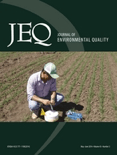
JOURNAL OF ENVIRONMENTAL QUALITY
Transforming Environmental Challenges into OpportunitiesJOURNAL OF ENVIRONMENTAL QUALITY, published by Wiley, is a premier academic journal in the field of environmental science, dedicated to advancing knowledge in areas such as environmental engineering, waste management, water science, and pollution control. With an ISSN of 0047-2425 and an E-ISSN of 1537-2537, this esteemed journal is recognized for its rigorous peer-review process and impactful research contributions, reflected in its Q2 category rankings across multiple subfields as of 2023, including a notable rank of #57 in Waste Management and Disposal. The journal serves as a vital platform for researchers, professionals, and students aiming to address contemporary environmental challenges through innovative solutions and policies. Covering a history of over five decades, from 1972 to 2024, the JOURNAL OF ENVIRONMENTAL QUALITY continues to be an essential resource for high-quality research and discourse in the pursuit of a sustainable environment.
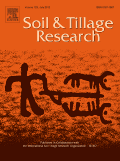
SOIL & TILLAGE RESEARCH
Unveiling the Secrets Beneath Our FeetSOIL & TILLAGE RESEARCH is a premier international journal dedicated to advancing the understanding of soil science and tillage practices through high-quality research and insightful reviews. Published by Elsevier and based in the Netherlands, this esteemed journal boasts impressive impact metrics, being ranked in the Q1 category across multiple domains including Agronomy and Crop Science, Earth-Surface Processes, and Soil Science, reflecting its pivotal role in the academic community. With an H-Index that underscores its citation impact and a Scopus ranking placing it in the top percentiles of its field, SOIL & TILLAGE RESEARCH serves as a vital resource for researchers and professionals focusing on sustainable agricultural practices, soil management, and environmental conservation. This journal provides a platform for open dialogue and dissemination of knowledge that shapes future research directions and policy-making in land use and sustainable agriculture.
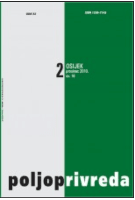
Poljoprivreda
Empowering agronomy through open access research.Poljoprivreda is a distinguished open-access journal dedicated to the field of agronomy and crop science, published by the FAC Agriculture Osijek in Croatia. Since its inception in 2000, the journal has been committed to disseminating high-quality research that informs both academic and practical advancements in agriculture. With an ISSN of 1330-7142 and an E-ISSN of 1848-8080, Poljoprivreda provides a vital platform for researchers, professionals, and students to engage with the latest findings and methodologies in agronomy, contributing significantly to the enhancement of agricultural practices in Croatia and beyond. Although currently ranked in the 22nd percentile within its category according to Scopus, the journal aspires to elevate its standing by welcoming innovative research that addresses contemporary challenges within the agricultural sciences. By fostering open access since 2000, Poljoprivreda ensures that its scholarly content is freely available, promoting wider dissemination and collaborative opportunities among researchers globally.
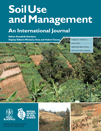
SOIL USE AND MANAGEMENT
Uncovering insights for a sustainable agricultural landscape.SOIL USE AND MANAGEMENT is a premier academic journal published by Wiley, focusing on the critical domains of Agronomy, Crop Science, Pollution, and Soil Science. With an ISSN of 0266-0032 and an E-ISSN of 1475-2743, the journal has established itself as a vital resource in the field since its inception in 1985. Operating from its U.S. headquarters in Hoboken, NJ, SOIL USE AND MANAGEMENT boasts impressive Q1 rankings across its relevant categories, indicating its standing in the top tier of research journals. Notably, it is ranked 48th out of 406 journals in Agronomy and Crop Science and holds an 88th percentile position, as well as a commendable rank of 26th out of 159 journals in Soil Science, underscoring its influence and reach. This journal serves as an essential platform for researchers, professionals, and students dedicated to sustainable soil management practices and understanding soil's role in agricultural productivity and environmental health. Although it does not offer Open Access, its rigorous peer-review process ensures the publication of high-quality original research, reviews, and case studies critical for advancing knowledge and practice in the field. This journal is crucial for anyone engaged in soil science and its related disciplines, encouraging innovative approaches to challenges facing soil use and management today.

Journal of Soil Science and Plant Nutrition
Fostering sustainable practices through cutting-edge research.The Journal of Soil Science and Plant Nutrition, published by SPRINGER INT PUBL AG, is a premier academic journal dedicated to advancing the fields of agronomy, plant science, and soil science. With an impressive Q1 ranking in both Agronomy and Crop Science and Plant Science, alongside a Q2 ranking in Soil Science, this journal stands at the forefront of innovative research and knowledge dissemination. Annually indexed in key databases, it provides a platform for high-quality research articles that explore the complex interactions between soil health and plant nutrition, contributing significantly to sustainable agricultural practices. Although it does not offer open access options, the journal is accessible through various academic institutions and libraries, ensuring a wide readership. With its emphasis on impactful findings, the journal is an essential resource for researchers, professionals, and students aiming to further their understanding and application of soil and plant science in an ever-evolving global context.
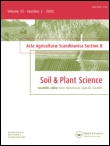
ACTA AGRICULTURAE SCANDINAVICA SECTION B-SOIL AND PLANT SCIENCE
Cultivating Knowledge for a Sustainable Agricultural FutureACTA AGRICULTURAE SCANDINAVICA SECTION B-SOIL AND PLANT SCIENCE, published by Taylor & Francis AS, is a distinguished journal dedicated to the fields of Agronomy, Crop Science, and Soil Science. With an impressive impact factor, and categorized in Q2 for both Agronomy and Crop Science and Soil Science as of 2023, this journal is an essential resource for researchers, professionals, and students aiming to advance their understanding of soil-plant interactions and sustainable agricultural practices. Operating since 1992 and continuing through to 2024, ACTA aims to publish high-quality, peer-reviewed research that encourages the applicability of advanced scientific knowledge in real-world agricultural settings. While the journal is not open access, it remains widely accessible through institutional subscriptions, reflecting its commitment to disseminating essential findings and fostering innovation in soil and plant science worldwide. Nestled in the vibrant academic environment of Norway, ACTA AGRICULTURAE SCANDINAVICA serves as a key platform for nurturing groundbreaking research that informs sustainable agricultural policies and practices globally.